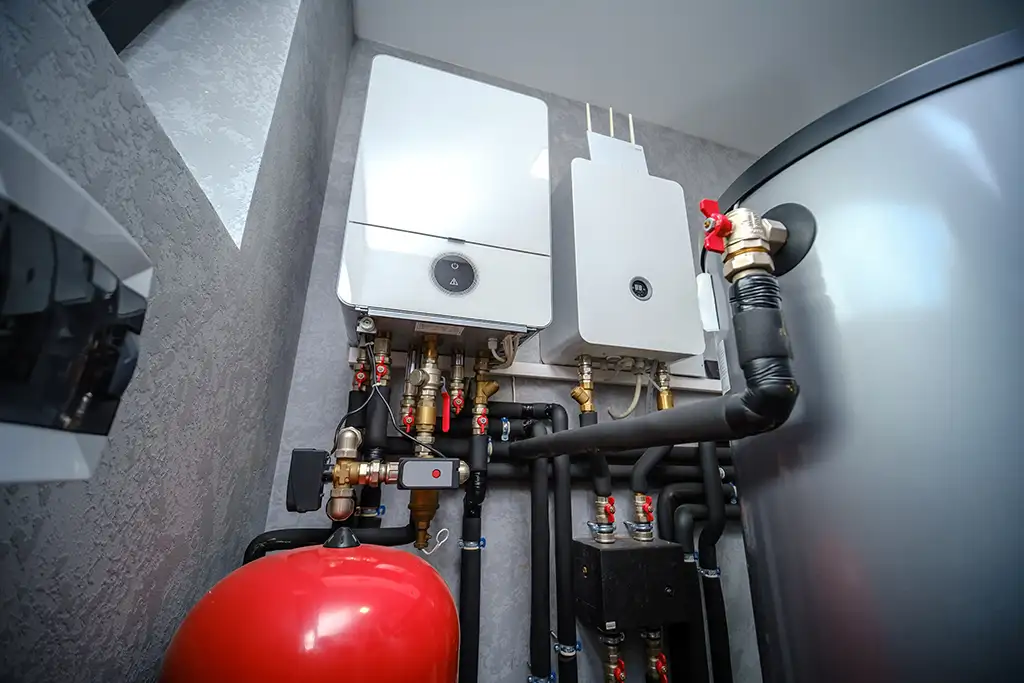
Are boilers safe? It’s a question many homeowners ponder, especially with winter approaching. While discussions about energy efficiency and smart thermostats are common, the heart of your heating system, the boiler, often gets overlooked. Let’s explore boiler safety to ease your concerns and enhance your awareness.
Understanding Boiler Safety: Are Boilers Safe?
When stressing about the question “Are boilers safe?” you need to remember that these types of heating devices go over strict control from manufacture to installation in order to be useful and secure for homeowners.
Modern boilers have numerous safety features, such as relief valves, to minimize risks. Understanding these features and ensuring proper maintenance is crucial for safe operation. Reputable boiler brands, like Ideal, Worcester, or Viessmann, typically equip their products with safety valves, pressure gauges, and sensors. These components help prevent overheating and dangerous pressure buildups.
Regular maintenance, much like a car’s tune-up, ensures these safety features function effectively. This is critical to maintain a safe boiler room. A properly maintained water boiler, along with a functioning gas valve, contributes significantly to a safe and warm home.
Common Boiler Hazards and How to Avoid Them
Boiler explosions are rare with modern systems. However, they can occur if safety valves fail or the water pressure isn’t regulated correctly. Regular maintenance by a qualified technician addresses these potential boiler dangers. The technician checks for carbon monoxide leaks, a colorless, odorless gas from incomplete combustion. This is critical for gas boilers.
Annual service and functioning carbon monoxide detectors offer vital protection. Monoxide leaks can lead to carbon monoxide poisoning. Another hazard is scalding from hot water and steam. Insulating exposed pipes and checking baseboard heater temperatures minimize this risk.
Burns can occur from direct contact with the boiler, piping, or baseboard heating units. It’s important to perform regular inspections and follow the manufacturer’s instructions for safe operation. Electrical hazards are also present due to faulty wiring or water leaks near electrical components.
Licensed electricians should handle electrical repairs and perform annual boiler inspections. Boilers can also cause water damage, mold growth, or equipment malfunction due to leaks. Keep the boiler area dry and well-ventilated. Smaller leaks can erode parts and damage the unit over time.
The Importance of Proper Maintenance and Professional Service
Human error and poor maintenance often cause boiler accidents. Regular servicing by a licensed technician is essential for boiler safety. A thorough maintenance program, including documented testing and prompt repairs, mitigates human-caused risks.
Malfunctioning low-water cutoffs also contribute to boiler issues. Regular testing of these safety devices is important. Proper ventilation is crucial for boilers using natural gas or propane. Insufficient combustion of air can lead to asphyxiation hazards. An HVAC expert should perform the necessary checks.
Consider a custodian, John, who after years of inquiring about boiler safety, became a maintenance technician. He attempted to clean soot from a boiler, resulting in severe burns due to its flammability. This highlights the importance of professional expertise when it comes to boiler maintenance.
How Safe Are Boilers in Bedrooms?
Placing a boiler in a bedroom presents significant safety concerns. UK guidelines discourage this practice. Gas appliances are generally avoided in sleeping areas. Some building codes prohibit combustion appliances in bedrooms. These may include steam boilers, gas fires, or specific water heaters.
Gas appliances often require safety controls, such as being room-sealed or having sensors, based on their kW input. A gas-safe registered engineer must conduct a risk assessment to ensure compliance. A boiler in a bedroom increases the risk of gas-related incidents, particularly during sleep when detection is delayed. Even with safety features and annual service, proximity to combustion appliances during sleep poses higher risks of undetected safety failures.
Conclusion
Are boilers safe? Generally, modern boilers are safe with proper installation and maintenance. However, like any complex appliance, neglecting maintenance can lead to serious issues. Regular contact with trusted plumbers for boiler needs and concerns helps avoid malfunctions.
Boilers require regular testing and cleaning for safe and efficient operation. By understanding the risks and taking preventative measures, homeowners reduce potential dangers. They gain confidence in their hot water and home heating systems. Unrepaired boiler problems can quickly escalate into emergencies. Proper maintenance reduces anxiety and improves quality of life with safe, reliable water heat and peace of mind. Direct contact with plumbers for drain cleaning services ensures that your pipes function correctly with your boiler.
Contact Clarks Mechanical today for boilder service or to schedule a free consultation.



